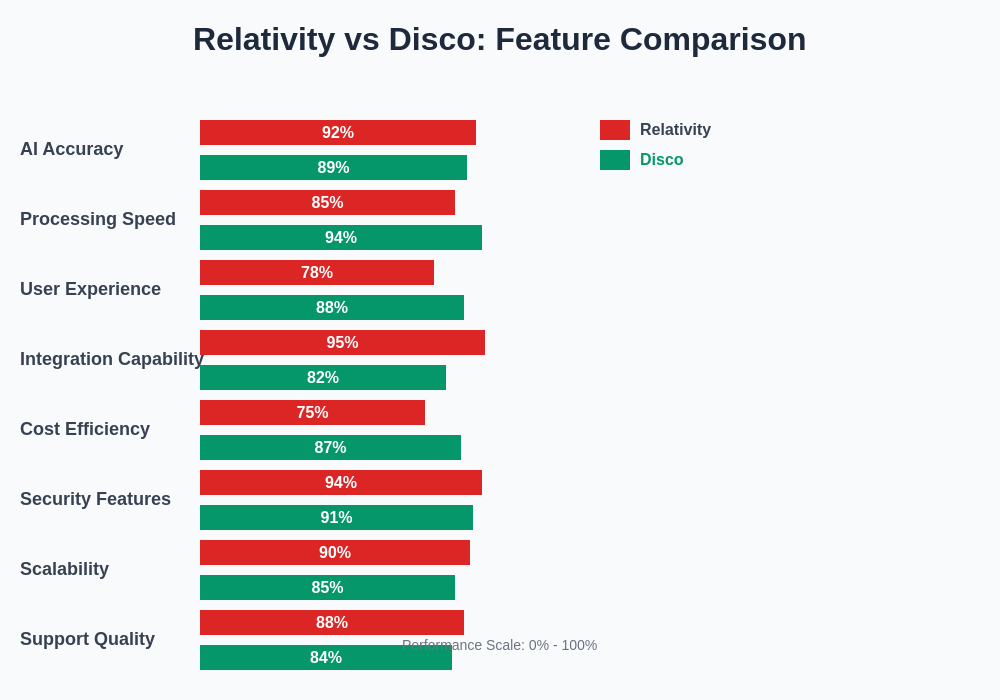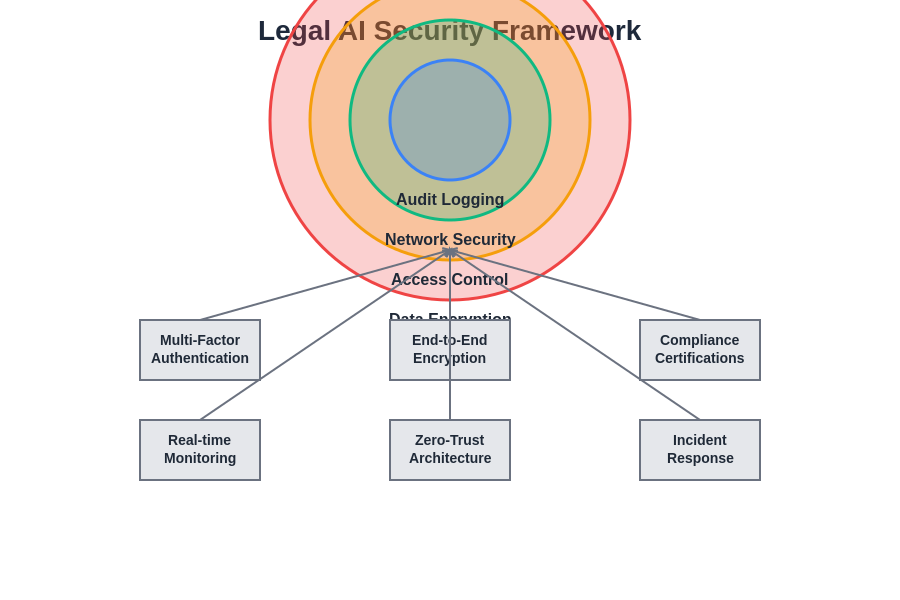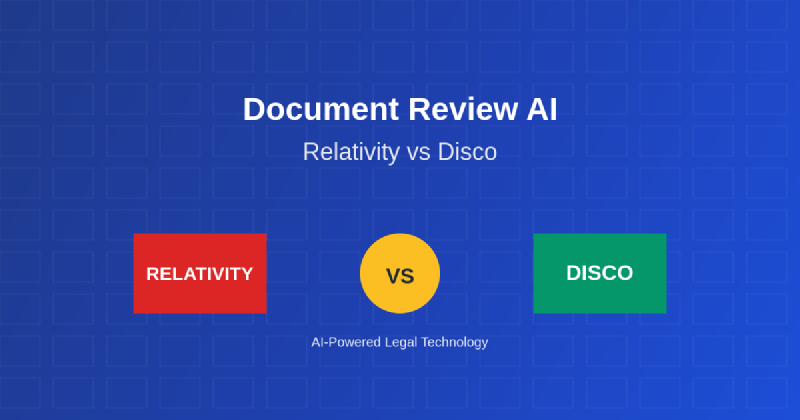The legal industry has experienced a profound transformation with the integration of artificial intelligence into document review and e-discovery processes, fundamentally changing how legal professionals approach complex litigation and regulatory investigations. At the forefront of this technological revolution stand two dominant platforms: Relativity and Disco, each offering sophisticated AI-powered solutions designed to streamline document analysis, enhance review efficiency, and reduce the time and costs associated with large-scale legal document processing.
Explore the latest trends in legal technology to understand how AI is reshaping the practice of law and transforming traditional legal workflows. The evolution of legal AI represents more than mere technological advancement; it embodies a fundamental shift toward data-driven legal practice where artificial intelligence augments human expertise to deliver more accurate, efficient, and cost-effective legal services.
The Evolution of Legal Document Review Technology
The traditional approach to document review in legal proceedings involved armies of junior associates and contract attorneys manually reviewing thousands or millions of documents to identify relevant materials for litigation or regulatory compliance. This process was not only extraordinarily time-consuming and expensive but also prone to human error and inconsistency, particularly in large-scale matters involving complex corporate transactions or multi-jurisdictional investigations.
The emergence of AI-powered legal technology platforms has revolutionized this landscape by introducing sophisticated machine learning algorithms, natural language processing capabilities, and predictive analytics that can analyze vast document repositories with unprecedented speed and accuracy. These platforms have transformed document review from a purely manual process into an intelligent, technology-assisted workflow that combines the efficiency of artificial intelligence with the nuanced judgment of experienced legal professionals.
Relativity: Comprehensive E-Discovery Platform
Relativity has established itself as a leading force in the e-discovery and legal technology space, offering a comprehensive platform that integrates advanced AI capabilities with robust document management and review tools. The platform’s AI functionality centers around RelativityOne, a cloud-based solution that leverages machine learning algorithms to enhance various aspects of the document review process, from initial data processing through final production of relevant materials.
The platform’s active learning capabilities represent one of its most significant technological achievements, enabling the system to continuously improve its document classification accuracy based on reviewer feedback and decisions. This iterative learning process allows Relativity to identify patterns in document relevance, privilege determinations, and other critical classifications, dramatically reducing the number of documents that require manual review while maintaining high accuracy standards essential for legal proceedings.
Relativity’s technology assisted review features include sophisticated clustering algorithms that group similar documents together, enabling review teams to process related materials more efficiently and ensure consistency in coding decisions. The platform’s email threading capabilities provide comprehensive views of communication chains, while its near-duplicate identification helps eliminate redundant review efforts by highlighting documents with minimal variations in content.
Experience advanced AI capabilities with Claude for comprehensive legal research and document analysis that complements traditional e-discovery platforms. The integration of multiple AI tools creates a powerful ecosystem for legal professionals seeking to maximize efficiency and accuracy in complex litigation matters.
Disco: Next-Generation Legal AI Platform
Disco, now part of CS Disco, has positioned itself as an innovative legal AI platform specifically designed to address the evolving needs of modern legal practice through cutting-edge artificial intelligence and machine learning technologies. The platform’s approach emphasizes user-friendly interfaces combined with powerful AI engines that can handle complex document analysis tasks while remaining accessible to legal professionals with varying levels of technical expertise.
The platform’s AI capabilities extend beyond traditional document review to include advanced analytics, predictive coding, and intelligent data visualization tools that provide legal teams with comprehensive insights into their document collections. Disco’s machine learning algorithms are designed to understand legal concepts, privilege determinations, and relevance criteria specific to different practice areas and case types, enabling more accurate and efficient document classification.
Disco’s cloud-native architecture provides scalability and performance advantages that are particularly valuable for large-scale litigation matters or regulatory investigations involving massive document volumes. The platform’s real-time processing capabilities enable legal teams to begin review activities while data collection and processing are still ongoing, significantly reducing overall project timelines and enabling more responsive litigation strategies.
The platform’s collaboration features facilitate seamless coordination among distributed legal teams, with real-time updates, comprehensive audit trails, and sophisticated quality control mechanisms that ensure consistency and accuracy throughout the review process. These collaborative capabilities have become increasingly important as legal teams operate in more distributed environments and handle matters that span multiple jurisdictions and time zones.
AI Technology Comparison and Capabilities
The artificial intelligence implementations in both Relativity and Disco represent sophisticated applications of machine learning and natural language processing technologies specifically tailored for legal document analysis. However, their approaches to AI integration differ in significant ways that impact user experience, accuracy, and overall effectiveness in different legal contexts.
Relativity’s AI technology emphasizes continuous learning and adaptation, with algorithms that become more accurate over time as they process more documents and receive feedback from human reviewers. This approach is particularly effective in large-scale matters where the AI system has sufficient data to develop robust predictive models. The platform’s active learning capabilities enable it to identify the most informative documents for human review, maximizing the efficiency of human expertise while minimizing unnecessary manual review.
Disco’s AI implementation focuses on intelligent automation and user-friendly interfaces that make advanced AI capabilities accessible to legal professionals without requiring extensive technical training. The platform’s algorithms are designed to understand legal concepts and terminology, enabling more accurate identification of legally significant documents and reducing false positive rates that can burden review teams with irrelevant materials.
Both platforms incorporate sophisticated natural language processing capabilities that can understand context, identify key concepts, and recognize relationships between documents and entities. These NLP features are essential for handling complex legal documents that may contain nuanced language, technical terminology, or industry-specific jargon that traditional keyword searching might miss.

The performance characteristics of these platforms demonstrate distinct strengths in different aspects of legal document review, with variations in processing speed, accuracy rates, and user satisfaction metrics that reflect their different technological approaches and design philosophies.
Cost Analysis and ROI Considerations
The economic impact of implementing AI-powered document review technology extends far beyond the initial platform licensing costs, encompassing significant reductions in manual review time, decreased attorney hours, and improved accuracy that can prevent costly oversights or missed deadlines. Both Relativity and Disco offer compelling value propositions, though their cost structures and pricing models differ in ways that may favor different types of legal organizations and matter profiles.
Relativity’s pricing model typically involves per-gigabyte processing fees combined with monthly user licensing costs, making it potentially more cost-effective for organizations handling large volumes of data with smaller review teams. The platform’s comprehensive feature set and established market presence often justify premium pricing, particularly for complex matters requiring advanced analytics and sophisticated workflow management capabilities.
Disco’s pricing approach emphasizes transparent, predictable costs with per-document or per-matter pricing options that can provide better cost visibility and budget control for certain types of legal work. The platform’s efficiency gains through AI automation can significantly reduce the total cost of document review by minimizing the number of documents requiring human review while maintaining high accuracy standards.
Discover comprehensive AI research capabilities with Perplexity to support your legal technology evaluation and implementation decisions with detailed market analysis and competitive intelligence. The strategic selection of legal technology platforms requires thorough analysis of both immediate costs and long-term value creation potential.
Integration and Workflow Optimization
The successful implementation of AI-powered document review technology requires careful consideration of integration requirements, workflow optimization, and change management processes that ensure legal teams can effectively leverage advanced capabilities while maintaining established quality standards and professional responsibilities.
Relativity offers extensive integration capabilities with existing legal technology ecosystems, including connections to major legal databases, case management systems, and billing platforms. The platform’s API architecture enables custom integrations and workflow automation that can align with specific organizational processes and requirements. These integration capabilities are particularly valuable for large law firms and corporate legal departments with complex technology environments and established workflows.
Disco’s integration approach emphasizes simplicity and user adoption, with pre-built connectors to popular legal applications and streamlined onboarding processes that minimize disruption to existing workflows. The platform’s cloud-native design facilitates rapid deployment and scaling, enabling legal teams to quickly adapt to changing matter requirements without significant infrastructure investments or technical complexity.
Both platforms provide comprehensive training and support resources designed to help legal professionals maximize the value of AI-powered document review capabilities. The learning curve for these advanced technologies can be significant, requiring investment in training and change management to ensure successful adoption across legal teams with varying levels of technical expertise.
Security and Compliance Framework
The handling of sensitive legal documents and confidential client information requires robust security frameworks and compliance capabilities that meet or exceed the stringent requirements of legal practice and regulatory oversight. Both Relativity and Disco have developed comprehensive security and compliance programs designed to protect sensitive information while enabling efficient document review processes.
Relativity’s security framework includes advanced encryption, multi-factor authentication, and granular access controls that enable precise management of document access and user permissions. The platform’s compliance certifications include SOC 2 Type II, ISO 27001, and various international standards that demonstrate commitment to information security and data protection. These certifications are particularly important for international legal matters and regulatory investigations that must comply with multiple jurisdictional requirements.
Disco’s security implementation emphasizes zero-trust architecture and cloud-native security controls that provide comprehensive protection for legal documents and sensitive information. The platform’s compliance program includes regular security audits, penetration testing, and continuous monitoring that ensure ongoing protection against evolving cyber threats and data security risks.

The security architecture of modern legal AI platforms must address multiple layers of protection, from data encryption and access control to network security and incident response capabilities that safeguard sensitive legal information throughout the document review lifecycle.
Performance Analytics and Quality Control
The effectiveness of AI-powered document review depends heavily on comprehensive performance analytics and quality control mechanisms that enable legal teams to monitor accuracy, identify potential issues, and continuously improve review processes. Both platforms provide sophisticated analytics and reporting capabilities designed to support quality assurance and process optimization.
Relativity’s analytics suite includes detailed reporting on reviewer performance, AI accuracy metrics, and workflow efficiency measurements that enable legal teams to identify optimization opportunities and ensure consistent quality standards. The platform’s quality control features include statistical sampling, ongoing validation, and comprehensive audit trails that support defensible review processes and regulatory compliance requirements.
Disco’s performance monitoring capabilities focus on real-time analytics and predictive insights that help legal teams make informed decisions about review strategies and resource allocation. The platform’s quality control mechanisms include automated consistency checking, intelligent sampling, and comprehensive reporting that support both process optimization and defensibility requirements.
The measurement of AI performance in legal document review requires sophisticated metrics that account for accuracy, efficiency, cost-effectiveness, and defensibility considerations that are unique to legal practice. These metrics must balance the competing demands of speed and accuracy while ensuring that AI-assisted review processes meet the professional standards and ethical obligations of legal practice.
Market Position and Industry Adoption
The competitive landscape of legal AI technology continues to evolve rapidly as both established players and innovative startups develop new capabilities and seek to capture market share in the growing legal technology sector. The adoption patterns and market positioning of Relativity and Disco reflect different strategic approaches to serving the diverse needs of legal organizations ranging from large international law firms to corporate legal departments and government agencies.
Relativity’s market position as an established leader in e-discovery technology provides significant advantages in terms of market recognition, customer base, and industry relationships. The platform’s comprehensive feature set and proven track record in large-scale litigation matters make it a preferred choice for many AmLaw 200 firms and Fortune 500 corporate legal departments handling complex, high-stakes matters.
Disco’s positioning as an innovative, next-generation legal AI platform appeals to organizations seeking cutting-edge technology and user-friendly interfaces that can accelerate adoption and maximize user productivity. The platform’s focus on AI-first design and cloud-native architecture attracts legal organizations looking to modernize their technology infrastructure and adopt more efficient review processes.
Future Developments and Technology Roadmap
The rapid pace of AI technology development ensures that both Relativity and Disco will continue to evolve their platforms with enhanced capabilities, improved performance, and new features designed to address emerging challenges in legal document review and e-discovery. The future development trajectories of these platforms will likely focus on several key areas of innovation and improvement.
Advanced natural language processing capabilities will enable more sophisticated understanding of legal concepts, improved accuracy in privilege determinations, and better identification of complex legal relationships and patterns within document collections. These improvements will reduce false positive rates and enable more precise targeting of relevant documents for human review.
Integration of large language models and generative AI capabilities may enable new features such as automated document summarization, intelligent brief generation, and comprehensive analysis of legal arguments and positions represented in document collections. These capabilities could significantly enhance the value that AI technology provides to legal professionals while maintaining the accuracy and reliability standards essential for legal practice.
Enhanced collaboration and workflow automation features will continue to improve the efficiency and effectiveness of distributed legal teams working on complex matters across multiple jurisdictions and time zones. These improvements will be particularly important as legal practice becomes increasingly global and teams become more distributed.
The integration of AI technology into legal practice represents a fundamental transformation that extends beyond simple automation to enable new approaches to legal analysis, strategy development, and client service delivery. The continued evolution of platforms like Relativity and Disco will play a crucial role in shaping the future of legal practice and determining how effectively legal professionals can leverage artificial intelligence to serve their clients and advance the administration of justice.
Strategic Implementation Considerations
The selection and implementation of AI-powered document review technology requires careful strategic planning that considers not only immediate technical requirements but also long-term organizational goals, professional development needs, and client service objectives. Legal organizations must evaluate their specific requirements, resources, and constraints to make informed decisions about technology investments that will support their practice goals and competitive positioning.
The evaluation process should include comprehensive analysis of matter profiles, document volumes, review team structures, and quality requirements that will influence platform selection and implementation approaches. Organizations handling primarily small to medium-sized matters may benefit from different technological approaches than those managing large-scale, multi-jurisdictional litigation or regulatory investigations.
Change management and user adoption considerations are equally important, as the successful implementation of advanced AI technology requires significant investment in training, process redesign, and cultural adaptation. Legal organizations must prepare their teams for the transition to AI-assisted workflows while maintaining the professional standards and ethical obligations that govern legal practice.
The strategic value of AI-powered document review technology extends beyond immediate efficiency gains to include competitive advantages, enhanced client service capabilities, and improved risk management that can support long-term organizational success and growth in an increasingly competitive legal market.
Disclaimer
This article is for informational purposes only and does not constitute professional advice regarding legal technology selection or implementation. The views expressed are based on publicly available information and general industry knowledge about AI-powered legal document review platforms. Legal organizations should conduct their own thorough evaluation of technology platforms, including detailed analysis of features, costs, security requirements, and integration capabilities that align with their specific needs and professional obligations. The effectiveness of AI-assisted document review may vary significantly depending on matter characteristics, document types, review objectives, and implementation approaches. Professional consultation with legal technology experts and platform vendors is recommended for organizations considering implementation of AI-powered document review solutions.
